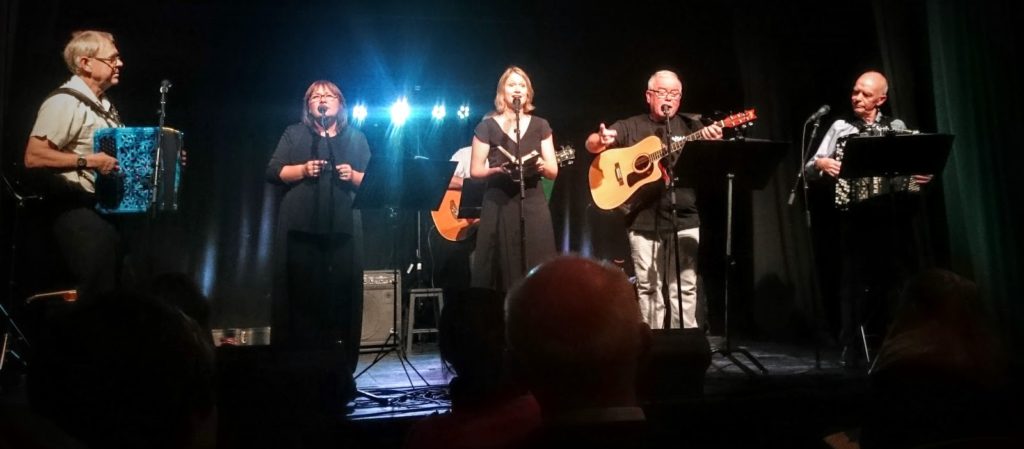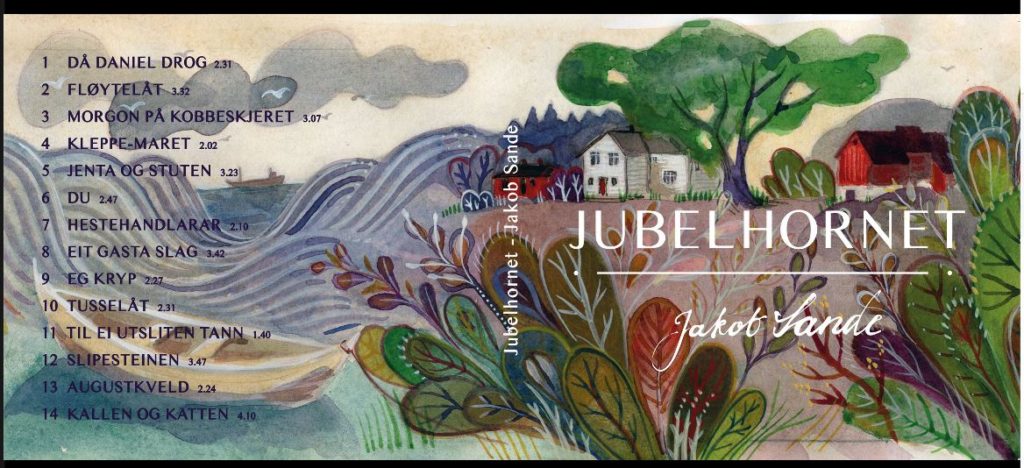Diktet om kuling i november (m.m.) er skrive av den walisiske lyrikaren og politikaren (m.m.) Waldo Williams (1904-1971). Ein fascinerande og viktig person. Diktet heiter «Mewn Dau Gae», omsett til «Between two fields» på engelsk. Den enkle løysinga på norsk er då «Mellom to felt».
Walisisk, altså. Det vert ikkje betre.
O ba le’r ymroliai’r môr goleuni
Oedd a’i waelod ar Weun Parc y Blawd a Parc y Blawd?
Ar ôl imi holi’n hir yn y tir tywyll,
O b’le deuai, yr un a fu erioed?
Neu pwy, pwy oedd y saethwr, yr eglurwr sydyn?
Bywiol heliwr y maes oedd rholiwr y môr.
Oddi fry uwch y chwibanwyr gloywbib, uwch callwib y cornicyllod,
Dygai i mi y llonyddwch mawr.
Rhoddai i mi’r cyffro lle nad oedd
Ond cyffro meddwl yr haul yn mydru’r tes,
Yr eithin aeddfed ar y cloddiau’n clecian,
Y brwyn lu yn breuddwydio’r wybren las.
Pwy sydd yn galw pan fo’r dychymyg yn dihuno?
Cyfod, cerdd, dawnsia, wele’r bydysawd.
Pwy sydd yn ymguddio ynghanol y geiriau?
Yr oedd hyn ar Weun Parc y Blawd a Parc y Blawd.
A phan fyddai’r cymylau mawr ffoadur a phererin
Yn goch gan heulwen hwyrol tymestl Tachwedd
Lawr yn yr ynn a’r masarn a rannai’r meysydd
Yr oedd cân y gwynt a dyfnder fel dyfnder distawrwydd.
Pwy sydd, ynghanol y rhwysg a’r rhemp?
Pwy sydd yn sefyll ac yn cynnwys?
Tyst pob tyst, cof pob cof, hoedl pob hoedl,
Tawel ostegwr helbul hunan.
Nes dyfod o’r hollfyd weithiau i’r tawelwch
Ac ar y ddau barc fe gerddai ei bobl,
A thrwyddynt, rhyngddynt, amdanynt ymdaenaiTachwedd
Awen yn codi o’r cudd, yn cydio’r cwbl,
Fel gyda ni’r ychydig pan fyddai’r cyrch picwerchi
Neu’r tynnu to deir draw ar y weun drom.
Mor agos at ei gilydd y deuem –
Yr oedd yr heliwr distaw yn bwrw ei rwyd amdanom.
O, trwy oesoedd y gwaed ar y gwellt a thrwy’r goleuni y galar
Pa chwiban nas clywai ond mynwes? O, pwy oedd?
Twyllwr pob traha, rhedwr pob trywydd,
Hai! y dihangwr o’r byddinoedd
Yn chwiban adnabod, adnabod nes bod adnabod.
Mawr oedd cydnaid calonnau wedi eu rhew rhyn.
Yr oedd rhyw ffynhonnau’n torri tua’r nefoedd
Ac yn syrthio’n ôl a’u dagrau fel dail pren.
Am hyn y myfyria’r dydd dan yr haul a’r cwmwl
A’r nos trwy’r celloedd i’w mawrfrig ymennydd.
Mor llonydd ydynt a hithau a’i hanadl
Dros Weun Parc y Blawd a Parc y Blawd heb ludd,
A’u gafael ar y gwrthrych, y perci llawn pobl.
Diau y daw’r dirhau, a pha awr yw hi
Y daw’r herwr, daw’r heliwr, daw’r hawliwr i’r bwlch,
Daw’r Brenin Alltud a’r brwyn yn hollti.
Ok, så finst det altså ei omsetjing til engelsk for oss som treng det. Den er av Rowan Williams:
Between two fields
These two fields a green sea-shore, the tide spilling
radiance across them, and who knows
where such waters rise? And I’d had years
in a dark land, looldng: where did it, where did he
come from then? Only he’d been there
all along. Who though? who
was this marksman loosing off bolts
of sudden light? One and the same the lightning
hunter across the field, the hand to tilt
and spill the sea, who from the vaults
above the bright-voiced whistlers, the keen darting ployers,
brought down on me such quiet, such
Quiet: enough to rouse me. Up to that day
nothing had worked but the hot sun to get me going,
stir up drowsy warm verses: like blossom
on gorse that cracldes in the ditches, or
like the army of dozy rushes, dreaming
of clear summer sky. But now: imagination
shakes off the night. Someone is shouting
(who?), Stand up and walk. Dance. Look.
Here is the world entire. And in the middle
of all the words, who is hiding? Like this
is how it was. There on the shores of light
between these fields, under these clouds.
Clouds: big clouds, pilgrims, refugees,
red with the evening sun of a November storm.
Down where the fields divide, and ash and maple
cluster, the wind’s sound, the sound of the deep,
is an abyss of silence. So who was it stood
there in the middle of this shameless glory, who
stood holding it all? Of every witness witness,
the memory of every memory, the life
of every life? who with a quiet word
calms the red storms of self, till all
the labours of the whole wide world
fold up into this silence.
And on the silent sea-floor of these fields,
his people stroll. Somewhere between them,
through them, around them, there is a new voice
rising and spilling from its hiding place
to hold them, a new voice, call it the poet’s
as it was for some of us, the little group
who’d been all day mounting assault
against the harvest with our forks, dragging
the roof-thatch over the heavy meadow. So near,
we came so near then to each other, the quiet huntsman
spreading his net around us.
Listen! you can
just catch his whistling, hear it?
Whistling, across the centuries of blood
on the grass, and the hard light of pain; whistling
only your heart hears. Who was it then, for God’s sake?
mocking our boasts, tracking our every trail and slìpping past
all our recruitìng sergeants? Don’t you know?
says the whistling, Don’t you remember?
don’t you recognise? it says; until we do.
And then, our ice age over, think of the force
of hearts released, springing together, think
of the fountains brealdng out, reaching up
after the sky, and falling back, showers
of falling leaves, waters of autumn.
Think every day, under the sun,
under these clouds, think every night of this,
with every cell of your mind’s branching swelling shoots;
but with the quiet, the same quiet, the steady breath,
the steady gaze across the two fields, holding still
the yision: fair fields full of folk;
for it will come, dawn of his longed-for coming,
and what a dawn to long for. He will arrive, the outlaw,
the huntsman, the lost heir making good his claim
to no-man’s land, the exiled king
is coming home one day; the rushes sweep aside
to let him through.

 Foto: Gustav Skaar
Foto: Gustav Skaar
Siste kommentarar